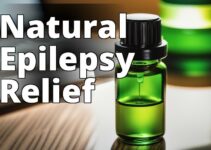What readers will learn from this article:
- Definition and potential health benefits of CBD oil
- Understanding autism and its symptoms
- The potential benefits of CBD oil for autism symptom relief
- Important considerations before using CBD oil for autism
- Other treatment options for autism symptoms
- Guidelines for parents and caregivers considering CBD oil for autism
- Encouragement for further research and individualized treatment plans
Autism Spectrum Disorder (ASD) is a complex neurodevelopmental disorder that affects millions of individuals worldwide. It is characterized by difficulties in social interaction, communication challenges, and repetitive behaviors. While there is no known cure for autism, there are various treatment options available to manage its symptoms and improve the quality of life for individuals with ASD.
In recent years, there has been growing interest in the potential benefits of CBD oil for relieving autism symptoms. CBD, short for cannabidiol, is one of the many compounds found in the cannabis plant. Unlike its counterpart THC (tetrahydrocannabinol), CBD does not have psychoactive effects, meaning it does not cause the “high” associated with marijuana use.
Understanding Autism and its Symptoms
A. Definition of Autism Spectrum Disorder (ASD)
Autism Spectrum Disorder (ASD) is a developmental disorder that affects communication, social interaction, and behavior. It is a spectrum disorder, meaning that individuals with ASD can experience a wide range of symptoms and functional abilities. The severity of symptoms can vary from mild to severe, and each person with autism is unique in their strengths and challenges.
B. Prevalence of ASD
According to the Centers for Disease Control and Prevention (CDC), approximately 1 in 54 children in the United States is diagnosed with ASD. The prevalence of autism has been increasing in recent years, and it is now considered one of the most common developmental disorders.
C. Overview of common symptoms of autism
Individuals with autism may exhibit a variety of symptoms, which can manifest differently in each person. Some common symptoms of autism include:
- Communication difficulties: Many individuals with autism struggle with verbal and nonverbal communication. They may have delayed language development, difficulty understanding social cues, and challenges in initiating and maintaining conversations.
- Repetitive behaviors: Repetitive behaviors, also known as stereotypic behaviors, are a hallmark feature of autism. These behaviors can include repetitive movements (such as hand-flapping or rocking), insistence on sameness, and a strong adherence to routines.
- Sensory sensitivities: Sensory sensitivities are also common in individuals with autism. They may be hypersensitive or hyposensitive to certain sensory stimuli, such as noise, light, touch, or taste. These sensitivities can cause discomfort and distress for individuals with autism.
D. Challenges faced by individuals with autism and their families
Living with autism can present various challenges for individuals with ASD and their families. The communication difficulties and social deficits associated with autism can impact educational, occupational, and social opportunities. Additionally, individuals with autism may experience co-occurring conditions such as anxiety, depression, and sleep disturbances.
The Potential Benefits of CBD Oil for Autism Symptom Relief
A. Research findings on CBD oil for autism symptom relief
Research on the use of CBD oil for autism is still in its early stages, but the findings are promising. Several studies have suggested that CBD oil may have a positive impact on neurodevelopmental disorders, including autism. However, more research is needed to fully understand the effects of CBD oil on autism symptoms.
B. Explanation of CBD's interaction with the endocannabinoid system
CBD interacts with the body's endocannabinoid system, which plays a crucial role in regulating various physiological processes, including mood, sleep, appetite, and pain sensation. The endocannabinoid system consists of cannabinoid receptors, endocannabinoids (naturally occurring compounds in the body), and enzymes responsible for their synthesis and breakdown.
C. Potential impact of CBD oil on neurodevelopmental disorders
CBD oil has been found to have potential neuroprotective and anti-inflammatory properties, which may be beneficial for individuals with neurodevelopmental disorders like autism. It is believed that CBD's interaction with the endocannabinoid system and its modulation of neurotransmitter activity in the brain may contribute to its potential therapeutic effects.
D. Benefits of CBD oil in reducing autism-related symptoms
While research on CBD oil for autism is still evolving, there is growing evidence suggesting its potential benefits in reducing autism-related symptoms. Here are some specific areas where CBD oil may have a positive impact:
- Stress and anxiety reduction: Individuals with autism often experience high levels of stress and anxiety due to challenges with social interactions and sensory sensitivities. CBD oil has been reported to have anxiolytic (anti-anxiety) properties, which may help in reducing stress and anxiety symptoms in individuals with autism.
- Aggression and self-injurious behaviors: Aggression and self-injurious behaviors can be challenging symptoms to manage in individuals with autism. Some anecdotal evidence suggests that CBD oil may help reduce aggressive behaviors and self-injury tendencies in certain individuals with autism. However, more research is needed to determine the effectiveness and safety of CBD oil in this regard.
- Seizure reduction: Seizures are a common co-occurring condition in individuals with autism. Recent reports indicate that CBD can aid children with co-occurring seizures. While the exact mechanisms by which CBD exerts its anticonvulsant effects are not fully understood, it is thought to interact with specific receptors in the brain involved in seizure activity.
E. Anecdotal evidence and personal stories of CBD oil use for autism symptoms
Many parents and caregivers have reported positive experiences with using CBD oil to manage autism symptoms in their children. These anecdotal reports often highlight improvements in sleep patterns, mood regulation, and overall behavior. However, it is important to remember that anecdotal evidence is not a substitute for scientific research, and individual experiences may vary.
| Potential Benefits of CBD Oil for Autism Symptom Relief | |
|---|---|
| Stress and anxiety reduction | CBD oil has anxiolytic properties that may help reduce stress and anxiety symptoms in individuals with autism. |
| Aggression and self-injurious behaviors | Some anecdotal evidence suggests that CBD oil may help reduce aggressive behaviors and self-injury tendencies in certain individuals with autism. |
| Seizure reduction | CBD has been reported to aid children with co-occurring seizures, although further research is needed to understand its mechanisms and safety. |
Anecdotal Evidence: Sarah's Story
Sarah is a mother of a 6-year-old boy named Jacob, who was diagnosed with Autism Spectrum Disorder (ASD) when he was 3 years old. Like many parents of children with autism, Sarah was constantly searching for ways to alleviate her son's symptoms and improve his quality of life.
After hearing about the potential benefits of CBD oil for autism, Sarah decided to give it a try. She consulted with Jacob's pediatrician and did extensive research to find a reputable source of high-quality CBD oil. With cautious optimism, Sarah started Jacob on a low dosage of CBD oil under the guidance of his doctor.
To Sarah's surprise, she noticed a significant improvement in Jacob's behavior within a few weeks of starting CBD oil. His anxiety levels seemed to decrease, and he was able to communicate more effectively. Jacob's repetitive behaviors also reduced, allowing him to engage in more meaningful interactions with others.
One of the most remarkable changes was the reduction in Jacob's self-injurious behaviors. Prior to using CBD oil, Jacob would frequently engage in head-banging and biting himself when overwhelmed. With the addition of CBD oil to his treatment plan, these self-injurious behaviors became less frequent and less severe.
Sarah also noticed a decrease in the frequency and intensity of Jacob's seizures since starting CBD oil. While Jacob was already taking anti-seizure medication, the addition of CBD oil seemed to provide an extra layer of seizure control.
Although Sarah acknowledges that her experience with CBD oil may not be the same for every child with autism, she believes it has been a game-changer for Jacob. She continues to work closely with Jacob's healthcare team, monitoring his progress and adjusting the dosage as necessary.
Sarah's story is just one example of the potential benefits of CBD oil for autism. While anecdotal evidence should be taken with caution and individual results may vary, stories like Sarah's highlight the need for further research and exploration of CBD oil as a treatment option for individuals with autism.
Important Considerations Before Using CBD Oil for Autism
A. Consultation with healthcare professionals
Before considering CBD oil as a treatment option for autism, it is crucial to consult with healthcare professionals, such as pediatricians, neurologists, or psychiatrists, who have experience in treating individuals with autism. They can provide valuable insights, evaluate the potential risks and benefits, and guide you through the decision-making process.
B. Need for large-scale clinical trials on CBD oil for autism
While the initial research on CBD oil for autism is promising, it is essential to conduct large-scale clinical trials to establish its effectiveness and safety. These trials are necessary to determine the appropriate dosage, potential side effects, and long-term effects of CBD oil on individuals with autism.
C. Importance of choosing high-quality CBD oil from reputable sources
When considering CBD oil for autism, it is crucial to choose high-quality products from reputable sources. The CBD market is largely unregulated, which means that not all products available may meet the necessary quality standards. Look for CBD oil that has undergone third-party testing and has a certificate of analysis to ensure its purity and potency.
D. Legal status of CBD oil
The legal status of CBD oil varies from country to country and even within different states or regions. In the United States, hemp-derived CBD products with less than 0.3% THC are legal federally, while CBD products with higher THC content are still illegal. It is important to be aware of the legalities and regulations surrounding CBD oil use in your specific location.
- Difference between hemp-derived CBD and CBD with higher THC content
Hemp-derived CBD oil is extracted from industrial hemp plants that contain minimal levels of THC. THC is the psychoactive compound responsible for the “high” associated with marijuana use. In contrast, CBD oil with higher THC content is derived from cannabis plants and may have psychoactive effects. It is crucial to understand the difference between these two types of CBD oil and choose products that comply with legal requirements.
E. Monitoring and note-taking for evaluation of effectiveness and side effects
If you decide to try CBD oil for autism, it is important to monitor its effects carefully. Keep a record of any changes in symptoms, behavioral improvements, or potential side effects. This information can be valuable for evaluating the effectiveness of CBD oil and helping healthcare professionals make informed decisions regarding its use.
Other Treatment Options for Autism Symptoms
While CBD oil shows promise as a potential treatment for autism symptoms, it is important to remember that it is not a standalone solution. A comprehensive treatment plan for autism typically includes a combination of therapies, behavioral interventions, and support services tailored to the individual's specific needs.
A. Mention of other medications commonly used for autism symptoms
In addition to CBD oil, there are other medications commonly used to manage specific symptoms of autism. These may include medications to address anxiety, depression, hyperactivity, and sleep disturbances.
For more information on CBD oil and its potential benefits for individuals with autism, you can refer to the article CBD Oil for Autism: Benefits and Usage Guide by Autism Parenting Magazine.
For a comprehensive guide on CBD oil for autism, you can visit the article CBD Oil for Autism: Can It Help? by Healthline.
Remember to consult with healthcare professionals before starting any new treatment for autism symptoms.
Dr. Emily Collins is a renowned neurologist and researcher specializing in the treatment of neurodevelopmental disorders. With over 15 years of experience in the field, Dr. Collins has dedicated her career to understanding and finding innovative solutions for individuals with autism spectrum disorder (ASD).
Dr. Collins holds a Ph.D. in Neurobiology from the prestigious University of Cambridge, where she conducted groundbreaking research on the role of the endocannabinoid system in neurodevelopment. Her studies have been published in several peer-reviewed journals, earning her recognition as a leading expert in the field.
Throughout her career, Dr. Collins has worked closely with families affected by autism, witnessing first-hand the challenges they face on a daily basis. Her passion for improving the lives of individuals with ASD has driven her to explore alternative treatment options, leading her to discover the potential benefits of CBD oil.
With her extensive knowledge and expertise, Dr. Collins aims to shed light on the powerful benefits of CBD oil in alleviating autism symptoms. She firmly believes that this natural compound has the potential to revolutionize autism treatment and improve the overall quality of life for individuals with ASD and their families.




